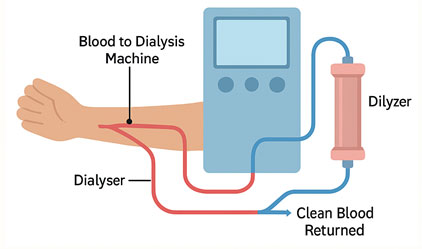How Does Dialysis Work?
 Dialysis is a treatment that takes over some of the kidney’s work by removing waste, salt, and extra water from the body. It also helps keep your blood pressure and certain minerals (like potassium and calcium) in balance.
Dialysis is a treatment that takes over some of the kidney’s work by removing waste, salt, and extra water from the body. It also helps keep your blood pressure and certain minerals (like potassium and calcium) in balance.
When kidney function drops too low, these jobs are no longer done effectively. Dialysis steps in to take over part of this work. It removes waste, excess water, and helps keep your blood chemistry in balance.
Your doctor may recommend dialysis when your kidneys cannot do these jobs anymore, or when the remaining function is not enough to keep your body in balance.
Your kidneys are vital organs with several important roles:
- Remove waste products from the blood.
- Remove extra water to keep the right balance of fluids in your body.
- Help control blood pressure by managing salt, water, and hormones.
- Produce hormones that help your body make hemoglobin, the part of red blood cells that carries oxygen and nutrients to your organs.
Healthy Kidneys vs. Dialysis
| Function | Healthy Kidneys | Dialysis |
|---|---|---|
| Remove waste products | Yes | Yes |
| Remove extra water | Yes | Yes |
| Regulate blood pressure | Yes | Helps, but not as well |
| Produce hormones for red blood cells (hemoglobin) | Yes | No (patients may need medicines or injections) |
There are two main ways dialysis can do this:
- By using a machine that filters your blood (hemodialysis).
- By using the lining of your abdomen as a natural filter (peritoneal dialysis).